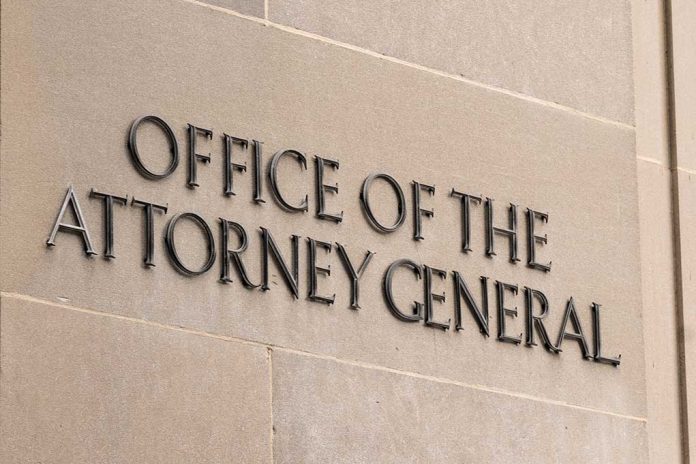
The Department of Justice files a lawsuit against New York State, challenging its sanctuary policies and ‘Green Light Law’ in a sweeping crackdown on illegal immigration.
Top Takeaways
- DOJ sues New York, Governor Hochul, and AG James over sanctuary policies and ‘Green Light Law’
- Lawsuit claims NY law obstructs federal immigration enforcement and endangers law enforcement
- AG Pam Bondi freezes DOJ funding for sanctuary jurisdictions and demands compliance with federal regulations
- Governor Hochul defends state laws, calling the lawsuit a publicity stunt
- Legal battle is part of broader federal effort to enforce immigration laws and remove illegal immigrants
DOJ Takes Aim at New York’s Sanctuary Policies
The U.S. Department of Justice has launched a legal offensive against New York State, filing a lawsuit that targets Governor Kathy Hochul, Attorney General Letitia James, and DMV Commissioner Mark Schroeder. The lawsuit challenges New York’s sanctuary policies, particularly the ‘Green Light Law,’ which allows undocumented immigrants to obtain driver’s licenses and restricts federal access to DMV data.
Attorney General Pam Bondi, spearheading this initiative, asserts that New York’s law directly impedes federal immigration enforcement efforts. The DOJ argues that these policies not only obstruct the implementation of federal immigration laws but also pose risks to law enforcement officers.
DOJ announces lawsuit against New York state over its policy of limiting cooperation with federal immigration enforcement.
US AG Pam Bondi:
“This is a new DOJ. New York has chosen to prioritize illegal aliens over American citizens. It stops. It stops today. https://t.co/c2q9roVNrR pic.twitter.com/7qHbQRf8Tx
— Prodigal (@ProdigalThe3rd) February 12, 2025
New York’s Defense and Federal Pushback
Governor Hochul has responded to the lawsuit, dismissing it as a publicity stunt. She maintains that current New York laws allow federal immigration officials to access DMV databases with a judicial warrant, a policy she describes as a common-sense approach supported by most New Yorkers.
“Here are the facts: our current laws allow federal immigration officials to access any DMV database with a judicial warrant. That’s a common-sense approach that most New Yorkers support,” said Hochul.
However, AG Bondi remains resolute in her stance. She has frozen DOJ funding for sanctuary jurisdictions and is conducting a comprehensive review of state and local sanctuary policies. This lawsuit against New York follows similar actions taken against Illinois and Chicago for their sanctuary city policies, signaling a broader federal strategy to combat such practices.
“This is a new DOJ, and we are taking steps to protect Americans,” Bondi told reporters. “New York has chosen to prioritize illegal aliens over American citizens.”
Implications for Immigration Enforcement
The DOJ’s actions are part of a larger federal effort to enforce immigration laws and remove illegal immigrants, including those charged or convicted of crimes. This includes withholding funding from organizations that support or provide services to illegal immigrants. The lawsuit highlights the ongoing tension between state autonomy and federal priorities in immigration policy.
The impact of these policies extends beyond legal battles. New York City Mayor Eric Adams, who has shown willingness to cooperate with federal immigration efforts, recently highlighted the strain on city resources due to the influx of migrants. He emphasized the need for expedited work programs for migrants, underscoring the complex challenges faced by local governments in managing immigration issues.
A Broader Battle Over Immigration Policy
This lawsuit is not an isolated incident but part of a larger political and legal battle over sanctuary policies and immigration enforcement. The federal government’s aggressive stance, exemplified by AG Bondi’s actions, signals a shift towards stricter enforcement of immigration laws. As the legal proceedings unfold, the outcome of this case could have far-reaching implications for the relationship between state and federal authorities in immigration matters, potentially reshaping the landscape of immigration enforcement across the country.














